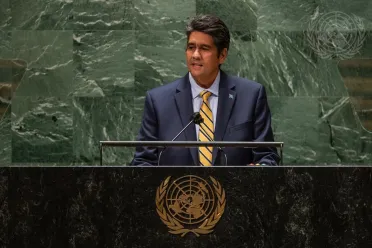Statement
Statement summary
SURANGEL WHIPPS JR., President of Palau, thanked allies like the United States, Australia, Japan and Taiwan that came to his country’s aid, delivering COVID-19 vaccines, personal protective equipment and testing capacity. This allowed Palau to remain COVID-free for most of the pandemic; 80 per cent of the population is fully vaccinated with no deaths or hospitalizations. Taiwan demonstrated leadership in the global pandemic response and it facilitated creation of an effective sterile corridor for travel between Palau and Taiwan. “We encourage the UN system to accept Taiwan as a valuable contributor to our collective efforts and strongly advocate for Taiwan’s participation in the UN system,” he said. Thanks to the strength of human resolve, global resources were mobilized in record time and numerous vaccines and treatments were developed. Still, more can and must be done to contain the virus.
The same level of urgency and bold action should be applied to respond to the existential threat of climate change, he said. In April, typhoon Surigae damaged 20 per cent of Palau’s homes, destroyed major infrastructure and millions of dollars worth of crops, and wreaked havoc on reefs and corals, undermining the island nation’s food security. Small island developing States like his lack economies of scale and rely on imports, making them among the most vulnerable to climate change. Natural disasters like rising sea levels and typhoons cannot be responded to “by kicking the can down the road”, he said, warning against complacency as the world is running out of time. “We must act now to ensure our children inherit a healthy and reliable future,” he said, and before further irreparable damage is done to the planet. Ocean-based climate action can play a significant role, resulting in up to 21 per cent of the greenhouse gas emission cuts needed to limit global temperature rise to 1.5°C by 2050.
A major impediment to addressing climate change risk for small island developing States is their inability to access climate financing, he said. Of the 20 per cent of financing set aside for adaptation, only 2 per cent went to these States, and half of those funds were in the form of loans, not grants. He urged the United Nations to address that inequality. He cited a recent study on the Palau National Marine Sanctuary by Stanford University which projected a 40 per cent decline in skipjack and yellowfin biomass in Palau’s waters by 2100 if the world continues on the current high emissions trajectory. In 2022, Palau will host the seventh Our Oceans Conference. In 2015, Palau declared most of its exclusive economic zone as the Palau National Marine Sanctuary. But this is not enough. “We need global action. It’s time that the international community commits to establishing a 30 per cent target that focuses on marine-protected areas within and beyond national jurisdictions,” he said.
He went on to say Palau is renewing its Compact of Free Association with the United States and expressed confidence that the new United States Administration will correct deficiencies in previous deliberations. Highlighting the fundamental Palauan principle of “we” and the community as a collective unit, he said the United Nations has an opportunity to reconcile global issues and unite to take the action needed to implement crucial solutions. The nations of the world must act like the surgeon fish and all come together, including Taiwan, he said, stressing that “Taiwan’s 23.5 million people must also be given a voice, as our UN Charter states: ‘We the peoples’.”
Full statement
Read the full statement, in PDF format.
Photo

Previous sessions
Access the statements from previous sessions.
